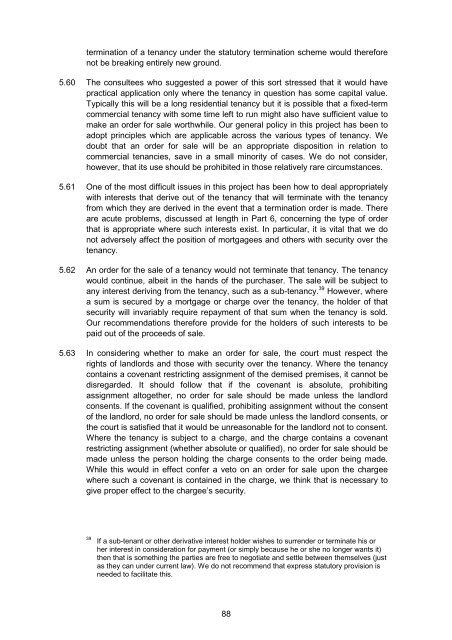Termination of Tenancies for Tenant Default - Law Commission
Termination of Tenancies for Tenant Default - Law Commission
Termination of Tenancies for Tenant Default - Law Commission
Create successful ePaper yourself
Turn your PDF publications into a flip-book with our unique Google optimized e-Paper software.
termination <strong>of</strong> a tenancy under the statutory termination scheme would there<strong>for</strong>e<br />
not be breaking entirely new ground.<br />
5.60 The consultees who suggested a power <strong>of</strong> this sort stressed that it would have<br />
practical application only where the tenancy in question has some capital value.<br />
Typically this will be a long residential tenancy but it is possible that a fixed-term<br />
commercial tenancy with some time left to run might also have sufficient value to<br />
make an order <strong>for</strong> sale worthwhile. Our general policy in this project has been to<br />
adopt principles which are applicable across the various types <strong>of</strong> tenancy. We<br />
doubt that an order <strong>for</strong> sale will be an appropriate disposition in relation to<br />
commercial tenancies, save in a small minority <strong>of</strong> cases. We do not consider,<br />
however, that its use should be prohibited in those relatively rare circumstances.<br />
5.61 One <strong>of</strong> the most difficult issues in this project has been how to deal appropriately<br />
with interests that derive out <strong>of</strong> the tenancy that will terminate with the tenancy<br />
from which they are derived in the event that a termination order is made. There<br />
are acute problems, discussed at length in Part 6, concerning the type <strong>of</strong> order<br />
that is appropriate where such interests exist. In particular, it is vital that we do<br />
not adversely affect the position <strong>of</strong> mortgagees and others with security over the<br />
tenancy.<br />
5.62 An order <strong>for</strong> the sale <strong>of</strong> a tenancy would not terminate that tenancy. The tenancy<br />
would continue, albeit in the hands <strong>of</strong> the purchaser. The sale will be subject to<br />
any interest deriving from the tenancy, such as a sub-tenancy. 39 However, where<br />
a sum is secured by a mortgage or charge over the tenancy, the holder <strong>of</strong> that<br />
security will invariably require repayment <strong>of</strong> that sum when the tenancy is sold.<br />
Our recommendations there<strong>for</strong>e provide <strong>for</strong> the holders <strong>of</strong> such interests to be<br />
paid out <strong>of</strong> the proceeds <strong>of</strong> sale.<br />
5.63 In considering whether to make an order <strong>for</strong> sale, the court must respect the<br />
rights <strong>of</strong> landlords and those with security over the tenancy. Where the tenancy<br />
contains a covenant restricting assignment <strong>of</strong> the demised premises, it cannot be<br />
disregarded. It should follow that if the covenant is absolute, prohibiting<br />
assignment altogether, no order <strong>for</strong> sale should be made unless the landlord<br />
consents. If the covenant is qualified, prohibiting assignment without the consent<br />
<strong>of</strong> the landlord, no order <strong>for</strong> sale should be made unless the landlord consents, or<br />
the court is satisfied that it would be unreasonable <strong>for</strong> the landlord not to consent.<br />
Where the tenancy is subject to a charge, and the charge contains a covenant<br />
restricting assignment (whether absolute or qualified), no order <strong>for</strong> sale should be<br />
made unless the person holding the charge consents to the order being made.<br />
While this would in effect confer a veto on an order <strong>for</strong> sale upon the chargee<br />
where such a covenant is contained in the charge, we think that is necessary to<br />
give proper effect to the chargee’s security.<br />
39<br />
If a sub-tenant or other derivative interest holder wishes to surrender or terminate his or<br />
her interest in consideration <strong>for</strong> payment (or simply because he or she no longer wants it)<br />
then that is something the parties are free to negotiate and settle between themselves (just<br />
as they can under current law). We do not recommend that express statutory provision is<br />
needed to facilitate this.<br />
88

















